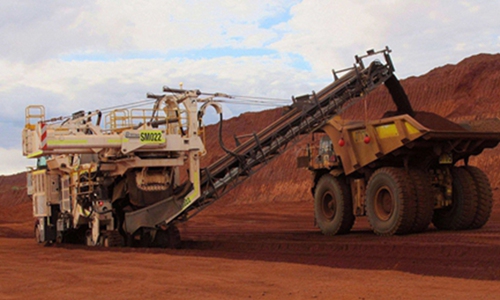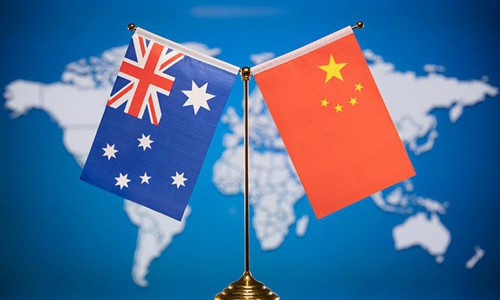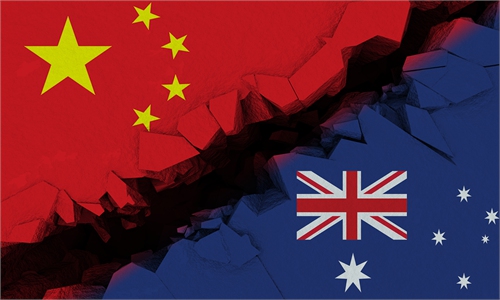
An iron ore mining site in Australia Photo: cnsphotos
Chinese industry participants are diversifying their sources of bulk commodities in an attempt to cut reliance on Australian imports, in the wake of rising trade tensions ignited by the Morrison administration's hostile policy toward China.
Industry experts said that Australian iron ore could be the next item to get embroiled in the diplomatic spat. Australian coal exports to China have fallen sharply since last year.
On Monday, the average price of 20-millimeter third-grade rebar on the market reached 5,168 yuan ($803.93) per ton, down 87 yuan per ton from April 30, according to MySteel monitoring, amid the tightened regulations on bulk commodities and other factors.
Australian media recently reported that China intends to "punish" Australia's iron ore sector through beefing up imports from Brazil. China is also working on a cooperation plan with Guinea in Africa, Australian news portal news.com.au reported on Saturday.
Several experts told the Global Times on Monday that given current China-Australia relations, diversifying the sources of supply for much-needed goods like iron ore has become part of China's long-term strategy to fend off the risks of too much reliance on any single source.
As the largest country in terms of steel output and exports, China's demand for iron ore has been strong. However, China depends heavily on iron ore imports, with around 80 percent of iron ore resources coming from abroad. About 60 percent of China's iron ore resources come from Australia and 20 percent from Brazil.
"It is a very rational approach to reduce China's one-sided dependence on Australia by diversifying iron ore imports, including the adjustment of import tariffs on scrap iron, given that some media outlets and politicians in Australia have been threatening to restrict or even cut off the supply of iron ore to China," Chen Hong, a professor and director of the Australian Studies Center at East China Normal University, told the Global Times on Monday.
The heavy reliance means that if there are changes in the two countries' iron ore trade, China's ore supplies will be tight, Wang Guoqing, research director at the Beijing Lange Steel Information Research Center, told the Global Times on Monday.
While the heavy reliance has made some Australian officials and media commentators believe that Australia's iron ore trade with China is "unshakable," industry insiders tell a different story.
Data from the Beijing Lange Steel Information Research Center showed that China's iron ore imports from Australia accounted for 60.93 percent of its total iron ore imports in 2020. The reading edged down to 59.97 percent for the first four months of this year.
"China's diversified iron ore importing sources has had a key impact on reducing imports of iron ore from Australia," said Wang.
Meanwhile, Brazil has gradually increased its supply of iron ore to China, with the latest data from Brazil's Ministry of Development, Industry and Foreign Trade showing that iron ore exports to China in April were 16.39 million tons, an increase of 103 percent year-on-year.
Chen said that China will reduce its dependence on Australian iron ore by increasing the use of scrap iron, a move that also involves environmental protection in order to achieve carbon neutrality.
China has been ramping up efforts to reduce trade risks. One conspicuous case is the reduction of Australian coal imports.
In 2020, China imported 300 million tons of coal in total, of which 78.09 million tons were from Australia, accounting for 25.7 percent, second only to Indonesia, accounting for 46.4 percent. This year, Mongolia has become China's biggest supplier of coking coal after China banned imports of Australian coal.
China's move to halt imports of Australian coal affects both sides to some extent, but on a deeper level, the impact on Australia is greater, since it will be difficult for Australia to find another buyer as big as China, according to Ruida Futures.
But experts noted that given the fact that Australian iron ore is of good quality, it will take time before the replacement of Australian iron ore can fully take place.


